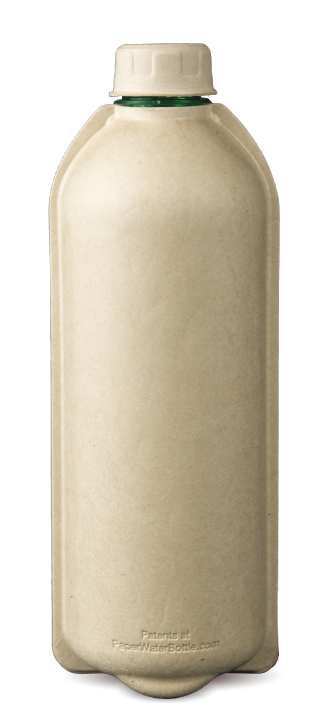Many companies are seeking out ways to eliminate plastic. Paper-based products are, naturally, their first choice. In a world first, SUPA have created a bottle for their washing up liquid that’s made entirely of paper and other bio-based materials.
The high level of research and development in the last few years has resulted in an evolution from early models that still included plastic liners and tops (which is why they are ‘paper-based’ instead of ‘paper’) to this world-first completely plastic-free paper bottle. The reason this is causing so much excitement is because they’ve made the inner liner out of a seaweed-based material, replacing the plastic liner that other paper-based bottles have been using.
“The environment doesn’t care if a product uses recycled plastic or not,” says SUPA co-founder Scott Nicholas. “It behaves exactly the same when it finds its way into our oceans, and with 33% of all single-use plastic waste finding its way into our ecosystems every year, paper and biomaterials that compost naturally are a no brainer choice.”
Companies currently developing paper bottles or using paper-based bottles include Unilever (who make OMO), Paper Water Bottle, and Coca-Cola (an essential player in this welcome development given their staggering level of contribution to world plastic waste as the world's number one plastic polluter for the fifth year in a row). Manufacturing paper bottles doesn’t stop there; these companies are also searching for responsibly sourced, recyclable and compostable wood pulp to use in their packaging and setting themselves sustainability targets.
It's a growing trend. In the face of slow global government measures to effectively address the problem of plastic waste and the realisation they are part of the problem, companies are taking it on themselves to lead the way. Unilever has made a commitment to halve their use of virgin plastic by 2025. Absolut vodka, Coca-Cola, and Carlsberg are some of the manufacturers of fizzy drinks currently trialling a paper bottle that uses no plastic as so far they’ve only been able to create one with a plastic liner and lid that stops the drink going flat or leaking. Carlsberg are already rolling out consumer trials in Europe of a bottle made from plant-based polymer lining and a wood fibre outer shell (see photo).
‘Consumer goods companies have played a huge role in perpetuating the plastic crisis, they can also help solve it. Companies must invest in reuse systems instead of single-use, eliminate problematic packaging types like sachets, and drastically reduce their plastic use.’ Von Hernandez, Global Coordinator, Break Free From Plastic
Calls for a Global Plastics Treaty with legally binding mechanisms and enforcement policies are moving slowly. The UN’s Intergovernmental Negotiating Committee is developing just such an international agreement, but the target to the first step of completing negotiations is still two years away. Given that Coca-Cola doubled their output of single-use plastics bottles in the last five years, we’re hoping the success private companies are having in addressing their own plastics use will catch on a lot faster than that.
‘There's always competition on sustainability credentials, but this is a healthy thing,’ Fin Slater, Packaging Europe magazine said. ‘Each sustainable innovation not only pushes the boundaries in relation to that particular packaging material, but increases the pressure on other materials to drive up recyclability, and drive down carbon footprints.’
We’re excited about these new possibilities and welcome every development as soon as possible.
2023 is a great time to think about how you can switch over
to more sustainable and eco-friendly paper too as an alternative to your packaging.
Nothing touches like paper.
Contact us for our full range of packaging products,
marketing materials and signage.



